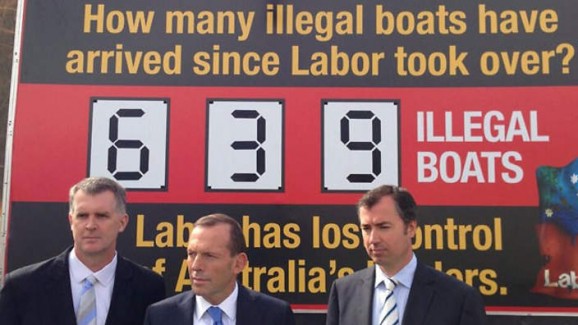The facets of Australian fascism: the Abbott Government experiment (Part 42)

By Dr George Venturini*
Testing the thesis . . . Obsession with crime and punishment (continued)
There are, it seems, no active union organisers – only “union thugs”. In 1998, during a protracted waterfront dispute, the Australian stevedoring workers were accused of costing the economy billions of dollars a year and to be denying others jobs. They were held responsible for “damaging Australia’s reputation as a reliable supplier of goods.” The Minister for Industrial Relations, Mr. Peter Keaston Reith constantly asserted that the Union was “holding the country to ransom, used bully boy tactics, had undue influence on work practices, and had a ‘stop-at-nothing approach’.” The Howard Government, proceeding on that assumption – no doubt carefully tested in publicly funded opinion polling, knew very well that, simply to mention the word ‘wharfies’ to some Australians would cause them to run in fear. Minister Reith thought nothing of importing balaclava-clad scabs fully trained in Dubai and assisted by assault dogs to be unleashed against the waterfront workers.
There are “illegals” – assigned to a class of non-persons. If somebody disagrees and organise that disagreement s/he is assigned the label which is meant to silence her/him or discredit her/his views. Media hired pens or mouths profitably join in to propagate insults, denigrating dissenters as “bleeding hearts” or members of the “chattering classes”, or of the “Aboriginal industry”.
After the aggression on Afghanistan and Iraq, when asylum seekers began to arrive by whatever means, they were officially branded as “illegals”. This is presently the language of the average Australian – thanks to irresponsible shock-jocks and rabid ‘journalists’.
A climate of political fear, inaugurated by Menzies and perfected by Howard was not abandoned – only reworded as ‘border protection’ – by the Rudd/Gillard/Rudd Governments. And then came Abbott! Thus victims came to be blamed for their own conditions. From that to religious bigotry the step became almost ‘natural’. Not only that – the perpetrators of that infamy turned themselves into defenders of Muslim women in Afghanistan!
In the meantime, in Australia, Muslim migrants from India or intending-migrant-university-full-fee-paying students in particular, have experienced frequent antagonism, regular racial slurs, and violence, all of which has resulted in great distress to them and a financial crisis for the ‘education industry’.
With recurring frequency, members of the Muslim community are being told ‘to shape up’ or ‘clear out’ and to ensure the teaching of ‘Australian values’ in their schools or risk losing their funding.
Nor were Australian subjects immune from such attitude. Such uncouthness is not only directed to ‘different’, ‘illegal’ – generally unwanted – persons. There are countless stories, too, of the intimidation of public servants in the Commonwealth Government.
The politicisation of the once-public service has become so pervasive that ‘public servants’ zealously anticipate government directives and protect ministers from reasonable scrutiny – and all for fear of what is ‘different’.
Ministerial responsibility is regarded as a quaint, ancient relic of more naive times.
Ms. Cornelia Rau is a case in point: she is a German citizen and Australian permanent resident who was unlawfully detained for a period of ten months in 2004 and 2005 as part of the Australian Government’s mandatory detention programme. Suffering from schizophrenia, she disappeared from a Manly Hospital in March 2004, and, in February 2005, it was revealed that she had been unlawfully detained at Brisbane Women’s Correctional Centre, a prison, and later at Baxter Detention Centre, after being classified as a suspected illegal immigrant or non-citizen by the Immigration Department when, under a crisis, she refused to reveal her true identity. Her detention became the subject of a government inquiry which was later expanded to investigate over 200 other cases of suspected unlawful detention by the Australian Government’s Department of Immigration and Multicultural and Indigenous Affairs. Ms. Rau is currently living in Adelaide.
Ms. Vivian Alvarez Solon, an Australian, suffering mental and physical health problems, was unlawfully removed to the Philippines, where she was born, by the same Department in July 2001. In May 2005 it became public knowledge that she had been deported, although the Department knew of the initial mistake in 2003, but failed to act. After the ordeal, Ms. Solon was able to return to Australia in November 2005.
In each case an overwhelmingly damning report was delivered to Parliament.
In both cases the ‘responsible’ ministers refused to accept any responsibility at all on the grounds that they did not know anything about the incidents investigated in the reports. Prime Minister Howard had deliberately ‘abused’ the wording and effect of the doctrine of ministerial responsibility which was that “for every act or neglect of his Department a minister must answer.” Middle level public servants would suffer for what was obviously the consequence of a relentless government campaign to demonise and expel ‘unlawful non-citizens’.
After the outrages on 11 September 2001 in the United States, the Howard Government was quick in proposing legislation to justify further police-state powers. And from then on – and after the October 2002 Bali bombing, the March 2004 Madrid train bombing, the July 2005 London subway bombing and countless others – there has been an escalation of measures restricting civil liberties. The Howard Government had been ratcheting up the so-called ‘war on terror’, hoping to foment fresh fears and insecurities to divert from its mounting political problems. The ‘national security’ minister, Attorney-General Philip Ruddock, submitted to Parliament bill after bill for acts which further violated human rights. On 8 February 2016 Mr. Ruddock announced that he would not contest the next federal election and was retiring from politics. On the same day, Foreign Minister Julie Bishop announced that Ruddock would be appointed Australia’s first special envoy for human rights.
At mid-2003, and with the support of the Labor Party, the Howard Government succeeded in pressing the Australian Parliament to approve an unprecedented piece of legislation giving the government’s political police the sort of arbitrary power normally associated with Fascist regimes or military juntas.
In Opposition, and in eleven years in government, Howard was a deft handler of the Australian populace. He knew their fears and phobias and he was masterful in playing on them, deploying them, managing them, manoeuvring them. He did two things. He prodded their fears, and then he offered them reassurance. He inflamed and then soothed, supplied the anxiety and also the temporary solution. He lasted that long because he was the ‘real’ Australian.
There was hardly anything new in this technique. During the long sixteen years of previous ‘anti-Labor’ regime, Menzies’ years 1949 to 1966, the language of fear had been adopted and perfected. Menzies had found ‘spiritual value’ in the Nazi regime and exalted it on his return from Germany in November 1938. The language is familiar. There were ‘those who belong’ and ‘the different’: the Communist, the Jews, the Gypsies, the homosexuals, the mentally deficient – ‘the others’, in other words. After a fairly long period of Hawke/Keating corporatist ‘Accord’ – to pacify the workers, Howard could resume the attack on ‘different’ Australians, and find skilled collaborators.
Tomorrow: Testing the thesis . . . Obsession with crime and punishment (continued)
 * In memory of my friends, Professor Bertram Gross and Justice Lionel Murphy.
* In memory of my friends, Professor Bertram Gross and Justice Lionel Murphy.
Dr. Venturino Giorgio Venturini devoted some sixty years to study, practice, teach, write and administer law at different places in four continents. In 1975 he left a law chair in Chicago to join the Trade Practices Commission in Canberra. He may be reached at George.Venturini@bigpond.com.au.









4 comments
Login here Register here-
stephentardrew -
stephentardrew -
Osiris -
Jack Russell
Return to home pageLet’s call a spade a spade. They use hate and fear as a weapon against the marginalised at all levels to divide the country into compliant self-absorbed drones threatened by those low life lefty do gooders.
Denigrate your opposition with catch phrases like soft on crime, illegals, dole, blugers, lazy, etc. Make people afraid and they become much more compliant. Build an imaginary threat then blame the victim. It is an act of immorality, cruelty and brutality towards those who suffer through no fault of their own yet get blamed for their circumstances.
We fight illegal wars in refugee home countries then blame the refugees for being refugees. Beautiful done destroy logical thinking and causal facts for rabid opinion based in retributive hate for those who suffer. The media is not interested in the rational facts they have become merchants of rabid opinion and hate speech.
Cannot edit beautiful for beautifully. No link.
The situation will get worse, much worse before it gets better. Unfortunately, populations only resort to drastic measures when the situation becomes unbearable for far too many. As they say, the darkest hour is just before the dawn.
“Excess generally causes reaction, and produces a change in the opposite direction, whether it be in the seasons, or in individuals, or in governments.” Plato
The price of peace is eternal vigilance.
Those who can be made to believe absurdities can be made to commit atrocities.